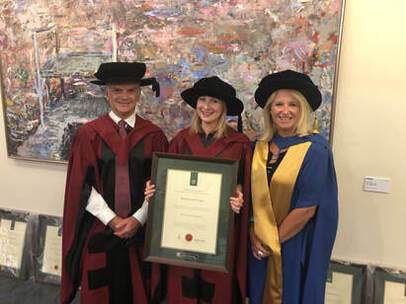

|
June 2022 Update
ESCALATION System implementation update:
Conferences and presentations: In April 2022, A/Prof Fenella Gill presented at the Australian and New Zealand Intensive Care Meeting on the ESCALATION research program and was awarded the best paediatric nursing paper. A/Professor Fenella Gill and Dr Pamela Laird (Raine Clinician Research Fellow) will be presenting for the Children’s Healthcare Australasia on the ‘First Nations perspectives on recognising and communicating concerns about their child’s clinical deterioration’. Follow the link below to join this event on June 16th Event Details – Children's Healthcare Australasia (wcha.asn.au) |
 Alannah with Curtin University supervisors Professor Gavin Leslie and Dr Janie Brown.
Alannah with Curtin University supervisors Professor Gavin Leslie and Dr Janie Brown.
|
February 2022 Update
ESCALATION System Clinical Simulation Study ACTION Last month WA nurses and doctors participated in four clinical simulation days in the Perth Children’s Hospital simulation suite. The clinical simulations formed a component of the study ‘ACTION: Optimising educAtion for the ESCALATION SysTem through clInical simulatiON’. The study is funded by a 2021 Clinical Simulation and Training Advisory Network (CSTAN) grant and the WA Chief Nurse and Midwifery Office. The aim of the clinical simulations was to assess if the ESCALATION System education and training program developed for Perth Children’s Hospital staff adequately prepares health professionals who work in other hospitals in WA. The results will inform the state-wide education and training program for the ESCALATION System to assist nurses and doctors to identify and care for children who are becoming more unwell in hospital. There is a focus on involving the family and on sepsis recognition. There were 14 participants who attended (11 Nurses, 3 Doctors) from Fiona Stanley Hospital, Rockingham Hospital, Bunbury Hospital and Perth Children’s Hospital. Participants had completed the ESCALATION System education and training program prior to participating in the clinical simulations. They participated in up to four clinical scenarios using the ESCALATION System. Thank you to David and Jon at the PCH Simulation suite who ran the clinical simulations so beautifully. Feedback from participants about the ESCALATION System has been extremely positive. We are currently analysing the data and look forward to sharing our key findings |
Participants from Bunbury Regional Hospital and Fiona Stanley Hospital with Fenella Gill
Participants in action with actor Megan in the role of a concerned Mum
|
|
Home
About Contact |
|
